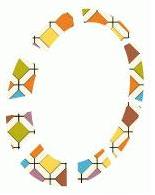Reperception of capitalistic principles
 Who would have thought that I would intervene on behalf of capitalism? I certainly not. What is the issue here? It is the paradox of perception: you're aware of yourself only through the awareness of others. We're all different and we all have different goals and aspirations. These we organize in groups, teams, organisations. We make create communities. Inside the group, our goals and aspirations are complementary: that is why we organize ourselves in the first place. Cooperation builds results, like the termite mounts. Co-operation brought us the city, the road, the telephone and the internet. It also brought us the pyramids, the different churches and the machines of war. Why? Because there is a back lash.
Who would have thought that I would intervene on behalf of capitalism? I certainly not. What is the issue here? It is the paradox of perception: you're aware of yourself only through the awareness of others. We're all different and we all have different goals and aspirations. These we organize in groups, teams, organisations. We make create communities. Inside the group, our goals and aspirations are complementary: that is why we organize ourselves in the first place. Cooperation builds results, like the termite mounts. Co-operation brought us the city, the road, the telephone and the internet. It also brought us the pyramids, the different churches and the machines of war. Why? Because there is a back lash. We do not notice that our self-created interdependence also creates conflicts. For instance, there is no fixed rule how to attribute the right value of a personal contribution to a group. And even if we can, that 'value' may change over time. He who invented the car yesterday, brought us traffic congestion today. The powder that makes a rocket fly, can be used to make a gun. Also, goal differences are differences within a larger goal. This prompts a new set of goals: that of integrating goals (and common means). Who takes on these goals? The Leader of the Pack. And then the double bind emerges: on the one hand we want to attain our own goals - and that is in the best interest of the group - and on the other hand, we have to pause and stop, when the leader thinks this is necessary and (s)he is the leader. Well, only Super(wo)man has Supervision, so there is no (wo)man who can always know what comes first: stopping to integrate for common interest or continu to pursue your own happyness.
These conflicts of interest - interestingly, the word interest has a double meaning - are impossible to resolve permanently. We have to deal with it every now and then. Like the Swiss with their avalanche: do not let the snow build up too high. You cannot stop the snow from falling. The situation is not always critical. And when it becomes, the snow may melt away. But every now and then, there is a real danger of a large avalanche. So the Swiss create small avalanches every now and then. It should be the same with organisations and communities: relax now and then. It should, we could, but we don't. Why?
The 'Lucifer principle' offers what seems to be a way out of attributing value internally: push internal competition to another group, export the conflict. This gives rise to competition between groups. This is remarkably effective. In fact, in my opinion, the very fact that Jericho was the first city ever is the reason why there is still a conflict in the Middle-East. The larger the city, the larger the group, the more differences in tasks and functions, the more difficult the integration, the higher the internal strife. But is pays: because the communal profit is high. This generates jealousy from the outsiders. They want to get in. So it is only natural that a larger wall has to be build. And then the war kindled. It is the tragedy of the commons combined with the accidental adversaries.
This is what we're still experiencing: competition, differences, war. So, it is obvious that we've learned that competition is at the heart of capitalism. It is not. Think again. Capitalism - ever wondered why we call the main city of a country capital - started out with cooperation.
This is more or less the same for other principles. We have to change the perceptual lenses. Here is a short survey. These are the reperceptions we'll have to learn to use. These are the pillars of capitalism we'll have to reconstite:
| False perception of principle | True perception of principle |
| Competition | Cooperating whithin competing produces useful ‘shit’ |
| Rationality | Passion, feeling, commitment precede rationality |
| Marketing and propaganda | Communication of differences raises awareness |
| Distrust and control | Long term trust and innovation with regular checks and feedback |


0 Comments:
Post a Comment
<< Home